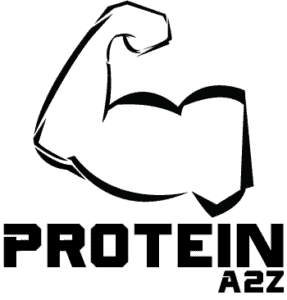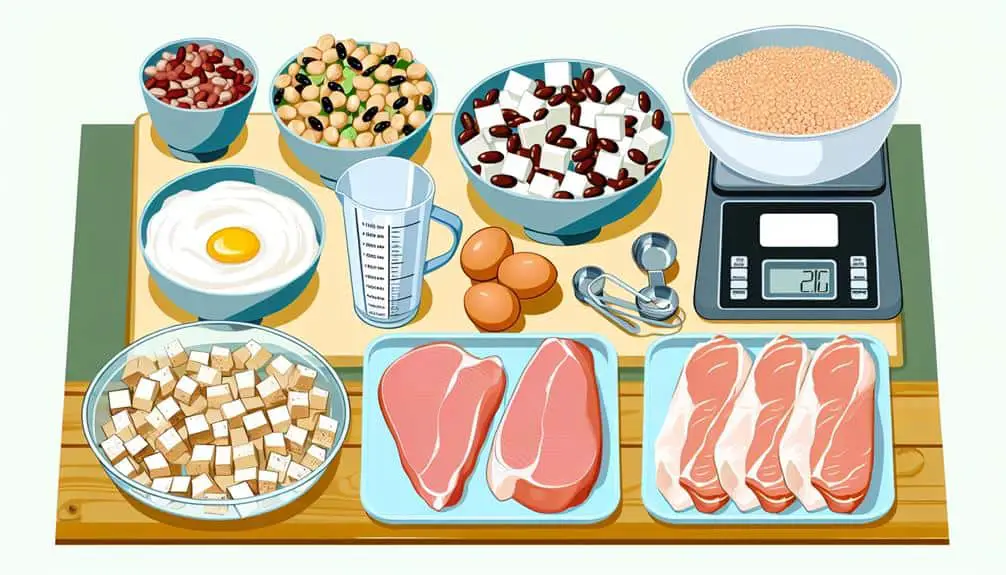Get ready to uncover practical strategies and food choices for reaching 120 grams of protein daily, making it a seamless part of your
If you're aiming to get 120 grams of protein a day, did you know that the average sedentary adult needs about 0.8 grams of protein per kilogram of body weight? Achieving this goal can seem daunting, but with the right strategies and food choices, you can make it a manageable part of your daily routine.
By exploring different protein-rich foods, planning your meals thoughtfully, and considering the impact of protein supplements, you can discover effective ways to meet your protein needs consistently.
Stay tuned to uncover practical tips and insights on how to reach your 120-gram protein target seamlessly.
Table of Contents
Importance of Protein Intake
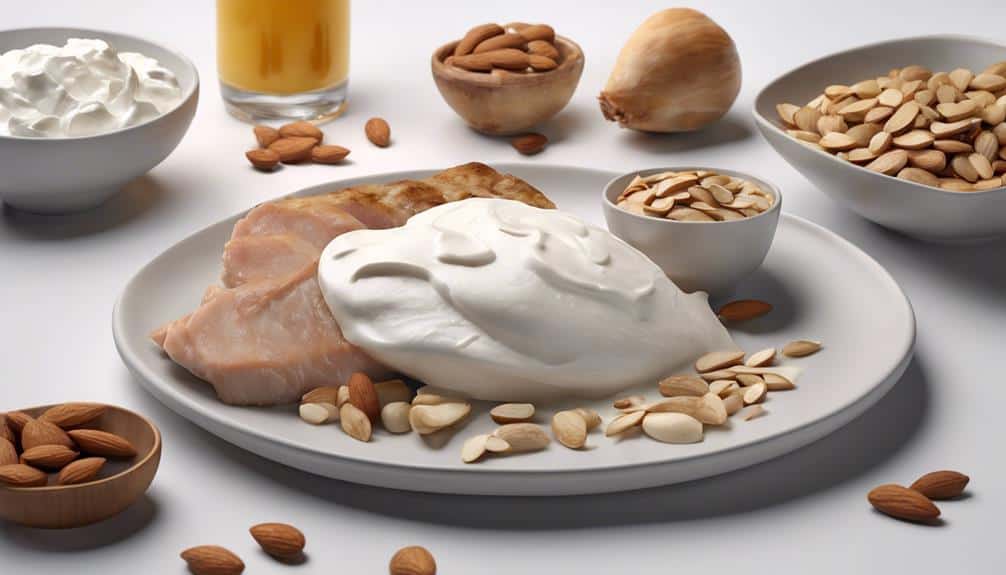
To achieve your fitness goals effectively, prioritizing your protein intake is crucial. Protein plays a vital role in muscle gain, weight loss, and overall body composition. Consuming an adequate amount of protein each day is essential for maintaining muscle mass, managing hunger levels, and supporting metabolic functions.
The recommended optimal protein intake varies depending on individual factors such as age, weight, and activity level. Ensuring you consume enough protein is key to proper cell repair, muscle growth, and hormone production. Meeting your personalized protein goals is vital for achieving the desired results in terms of muscle gain or fat loss.
Therefore, it's important to understand the significance of protein in your diet and strive to include a sufficient amount of protein-rich foods to support your fitness journey. Aim to reach the recommended grams of protein per day to maximize the benefits protein can offer for your body and overall health.
Setting Your Protein Goal
When determining your protein goal, calculate the minimum grams needed daily by multiplying your weight in pounds by 0.36. This calculation gives you a baseline target for your protein intake per day. However, keep in mind that factors such as your activity level, muscle mass goals, and overall health status can influence your protein goals.
For individuals who are active or aiming for muscle gain, setting a protein goal of 120 grams a day could be appropriate. It's essential to tailor your protein intake to your specific needs.
To ensure you meet your protein goals, consider incorporating a high protein meal plan into your daily routine. This may involve including protein-rich foods such as lean meats, poultry, fish, eggs, dairy products, legumes, nuts, and seeds in your meals and snacks. Remember that protein is crucial for muscle repair, growth, and overall health maintenance.
If you're unsure about how to set personalized protein goals, consulting a nutritionist can provide you with tailored recommendations to support your individual needs.
Calculating Your Daily Protein Needs

Determining the amount of protein you need daily can be done by multiplying your weight in pounds by 0.36. This calculation gives you an estimate of the grams of protein you should aim for per day.
For instance, if you weigh 150 pounds, your protein needs would be around 54 grams per day (150 lbs x 0.36 = 54g).
Remember to adjust your protein intake based on factors like your activity level, muscle mass, and overall health goals. Individual protein needs can vary, so it's advisable to consult a nutritionist for personalized recommendations tailored to your specific requirements.
High Protein Food Choices
To maximize your protein intake, consider incorporating high protein food choices such as lean meats, seafood, plant-based options, dairy products, and nuts into your daily meals. Lean meats like chicken, turkey, and beef are excellent sources of high-quality protein. Seafood such as salmon, tuna, and shrimp provide not only protein but also essential omega-3 fatty acids. Plant-based options like tofu, tempeh, and edamame offer a meatless protein boost while being rich in nutrients. Dairy products like Greek yogurt, cottage cheese, and low-fat milk are convenient ways to increase your protein intake. Nuts, seeds, and nut butter are not only tasty snacks but also convenient and protein-rich options to incorporate throughout the day.
| Protein Sources | Examples |
|---|---|
| Lean Meats | Chicken, Turkey, Beef |
| Seafood | Salmon, Tuna, Shrimp |
| Plant-Based | Tofu, Tempeh, Edamame |
Incorporating Protein Into Meals
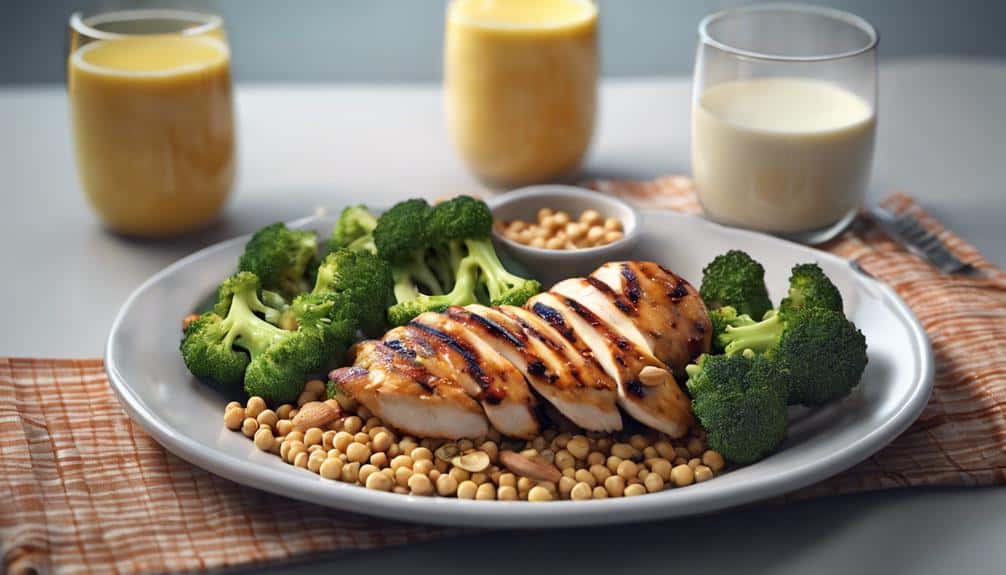
Consider incorporating lean meats, fish, eggs, quinoa, tofu, cottage cheese, or low-fat milk into your meals to enhance your protein intake. These protein sources offer a variety of high-protein options to help you meet your daily protein goals effectively. When planning your meals, aim to include high-quality protein sources like chicken breast, ground turkey, fish, nuts, chia seeds, lentils, tofu, and oats. By swapping lower protein foods for these higher protein options, such as bean-based pasta, Greek yogurt, quinoa, and bone broth, you can ensure that your meals are balanced and protein-rich.
To create well-rounded and satisfying meals, focus on incorporating a protein source alongside vegetables, whole grains, and healthy fats. For example, you could enjoy a grilled salmon fillet with quinoa and roasted vegetables, or a tofu stir-fry with brown rice and stir-fried veggies. By including protein-rich foods in your meals, you can ensure that you're fueling your body with the nutrients it needs to support your health and fitness goals.
Protein-Rich Snack Ideas
Looking for protein-rich snack ideas to boost your daily intake effectively? Look no further!
Greek yogurt is a fantastic option with 17g of protein in a 6-ounce serving. It's not only delicious but also a convenient snack to keep you satisfied.
Another great choice is cottage cheese, providing 14g of protein per half cup. Pair it with some fruit for a balanced snack.
If you're on the go, grab a hard-boiled egg, packing 6g of protein in each egg. They're easy to prepare in advance and carry with you wherever you need a quick protein boost.
Almonds are also a handy snack, offering 6g of protein per ounce.
For those craving a sweeter option, consider a protein bar with around 20g of protein to fuel your day.
Incorporating these protein-rich snacks into your daily routine can help you reach your goal of consuming 120 grams of protein each day.
Meal Prep for Protein Success
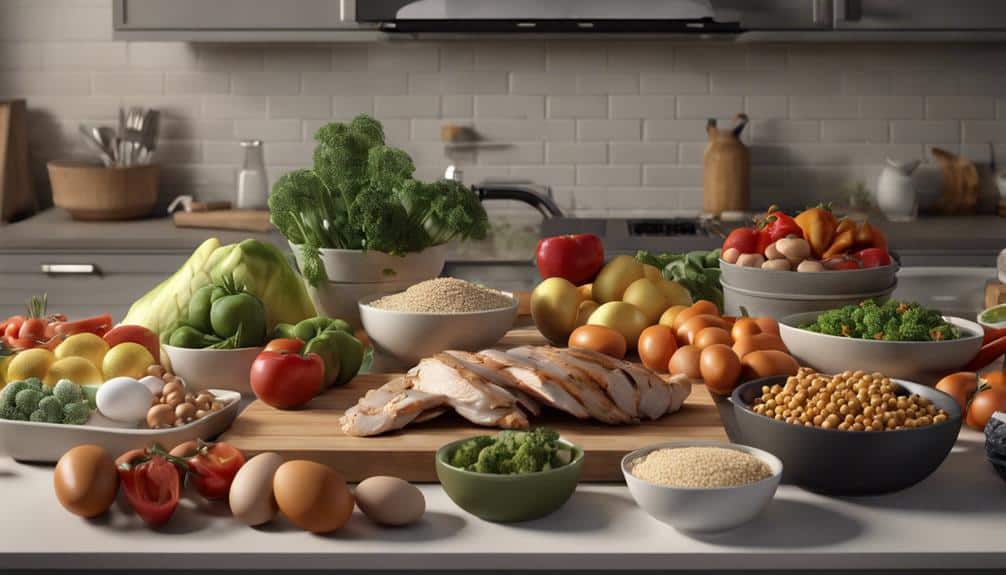
When it comes to maximizing your protein intake, meal prep is key for ensuring consistent and successful results. Planning and preparing your meals in advance can help you meet your daily protein goal of 120 grams.
Utilize portion control techniques and meal prepping strategies to ensure you have protein-rich options readily available throughout the day. Incorporate high-protein snacks like Greek yogurt, hard-boiled eggs, or protein bars into your meal prep routine to boost your protein intake.
Focus on including lean protein sources such as chicken, fish, tofu, and legumes in your meals to create a balanced and nutritious diet. Experiment with various protein-rich recipes and cooking methods to keep your meals exciting and satisfying while meeting your protein requirements.
Meal planning is a crucial aspect of achieving your protein goals, so invest time in preparing your meals to set yourself up for protein success.
Tracking Your Protein Intake
To accurately monitor your daily protein intake, utilize a food diary or a mobile app for tracking. By keeping a record of what you eat and checking labels for protein content in foods, you can ensure you are meeting your protein goals. Aim for a minimum of 20 grams of protein per meal to reach the target of 120 grams daily. Dividing your protein intake evenly across meals and snacks helps in maintaining a balanced distribution throughout the day. Experimenting with different protein-rich foods and recipes not only keeps your meals exciting and varied but also helps you discover new sources of protein to incorporate into your diet.
| Protein Source | Protein Content (g) |
|---|---|
| Chicken Breast | 25 |
| Greek Yogurt | 15 |
| Lentils | 18 |
| Almonds | 6 |
Protein Supplements Vs Whole Foods
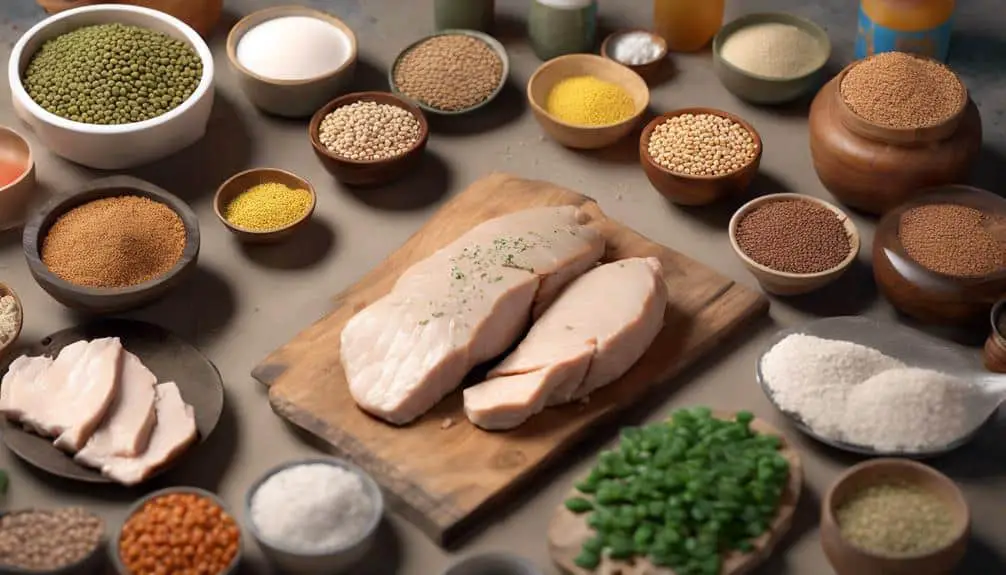
After tracking your protein intake diligently, it's important to weigh the benefits of protein supplements versus consuming whole foods to meet your daily protein requirements effectively. Whole foods like chicken, fish, eggs, nuts, and legumes not only provide protein but also essential nutrients that contribute to overall health and well-being. They offer a variety of flavors, textures, and nutrients that can enhance meal satisfaction compared to protein supplements.
On the other hand, protein supplements can be convenient for individuals with busy lifestyles or specific dietary needs, helping them meet their daily protein goals efficiently. However, it's essential to note that protein supplements may lack certain micronutrients present in whole foods, making a balanced diet incorporating both sources beneficial for optimal health.
Therefore, considering a mix of whole foods and protein supplements can be a strategic approach to reaching your daily protein goals while ensuring a well-rounded nutrient intake.
Protein Cooking Tips
Looking to enhance the protein content of your meals through effective cooking techniques? Here are some protein cooking tips to help you make the most out of your protein sources:
- Choose lean cuts of meat: Opt for lean cuts like chicken breast, turkey, or pork loin to increase your protein intake without consuming excess saturated fats.
- Utilize protein-friendly cooking methods: Use grilling, baking, or broiling to retain the protein content in meats while avoiding deep frying to prevent excessive fat and calorie intake.
- Enhance flavor with protein-rich marinades: Incorporate marinades or rubs with high-protein ingredients like yogurt, soy sauce, or spices to add flavor to your dishes while boosting the protein content.
- Experiment with different protein sources: Try out ingredients like tempeh, seitan, or edamame to introduce variety in your meals and explore new protein-rich options.
Eating Out While Meeting Protein Goals

When dining out while aiming to meet your protein goals, prioritize selecting dishes that feature protein-rich options such as grilled chicken, salmon, or tofu.
Opt for salads with lean protein sources like grilled chicken or shrimp. Look for customizable options to boost protein content, such as adding extra chicken or beans to your meal.
Avoid deep-fried or breaded protein choices; instead, choose grilled, baked, or steamed options for a healthier protein intake when dining out. Request dressings and sauces on the side to have better control over added fats and sugars, focusing on protein-rich main dishes.
Adjusting Protein Intake for Fitness Goals
To optimize your protein intake for your fitness goals, ensure you adjust your daily consumption based on factors such as muscle gain or weight loss objectives. Here's how you can adjust your protein intake:
- Assess Your Fitness Goals: Determine whether your primary focus is on muscle gain or weight loss, as this will influence your protein needs.
- Calculate Your Protein Requirement: For muscle gain, aim to consume between 1.2-2.2 grams of protein per kilogram of body weight. Adjust this based on your specific fitness goals and activity level.
- Prioritize Protein for Muscle Gain: If your goal is muscle gain, ensure you prioritize protein intake to support muscle growth and recovery after workouts.
- Personalize Your Protein Goals: Consider individual factors like age, weight, and training intensity to personalize your protein intake for optimal results in achieving your fitness goals. Adjust as needed to meet your specific needs and objectives.
Celebrating Protein Milestones
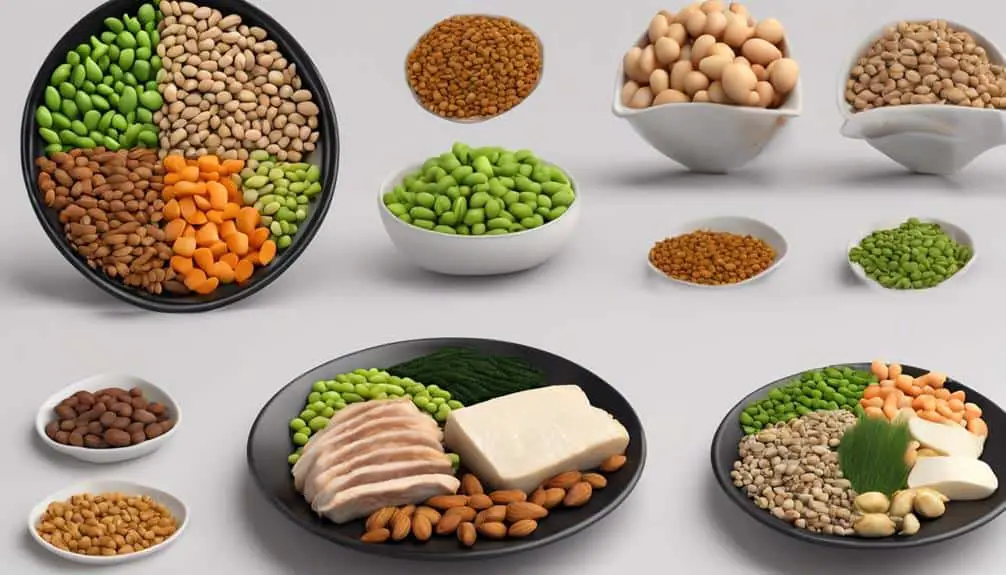
Celebrate your protein milestones by acknowledging your progress towards achieving daily protein goals. When incorporating lean protein sources like chicken, fish, tofu, and Greek yogurt into your meals, you aren't just hitting your 120g target but also fueling your body with quality nutrients.
Meal planning plays a crucial role in ensuring you meet your protein needs consistently. By including protein at each meal and snack, you can distribute your intake throughout the day, making it easier to reach your milestone. Opt for protein-rich snacks such as hard-boiled eggs, nuts, or Greek yogurt to supplement your daily protein consumption.
Tracking your protein intake allows you to monitor your progress and make adjustments as needed to stay on course. Remember, each step towards your protein goal is a reason to celebrate and a testament to your commitment to a healthier lifestyle. Keep up the great work!
Frequently Asked Questions
Is 120g of Protein a Day Too Much?
Consuming 120g of protein a day isn't necessarily too much, especially for active folks or those aiming to build muscle. Protein requirements vary based on factors like weight, activity level, and fitness goals.
120g of protein can aid muscle growth, recovery, and overall health when spread across meals and snacks. It's crucial to consider individual needs and adjust protein intake accordingly.
Consulting a nutrition expert can help tailor protein intake to your specific goals and needs.
How Many Eggs Make 100g Protein?
To reach 100 grams of protein from eggs alone, you'd need around 16-17 large eggs. It's crucial to balance egg intake with other protein sources for a well-rounded diet.
Eggs are versatile and packed with nutrients, making them a great addition to meals. Including eggs in your diet can help you meet your daily protein target effectively.
What Should I Eat to Get 100 Grams of Protein a Day?
To get 100 grams of protein a day, focus on lean meats like chicken and fish, plant-based options such as tofu and legumes, and snacks like Greek yogurt and nuts.
Incorporate eggs, dairy, and protein shakes for variety. Plan balanced meals with a mix of these protein sources to meet your goal.
Stay consistent and mindful of your choices throughout the day to ensure you reach your protein intake target.
How to Get 130 G of Protein a Day?
To get 130 grams of protein a day, focus on including lean protein sources in each meal and snack. Incorporate foods like chicken, fish, tofu, eggs, and Greek yogurt.
Have protein-rich snacks like nuts, Greek yogurt, hard-boiled eggs, or protein bars throughout the day. Use protein supplements such as powders or shakes if needed.
Plan and prepare your meals in advance to ensure you have protein-rich options available.
